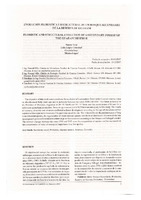Evolución florística y estructural de un bosque secundario de la reserva Guaraní
Floristic and structural evolution of a secondary forest of the Guaraní reserve
Date
2007-12-01Author
Vera, Norma Esther
López Cristóbal, Lidia Mirta
Sosa, Graciela
López, Mónica
Metadata
Show full item recordAbstract
El objetivo del trabajo fue evaluar la evolución del bosque secundario de la Reserva de Guaraní, desde su abandono hace 30 años y en particular entre los años 1998 y 2003. Se halla ubicado en la Provincia de Misiones, Argentina a 26° 15' S y 54° 15' O y su uso previo fue producción agrícola de subsistencia. Para su estudio se censaron los árboles en una parcela permanente de 0,75 ha. Los resultados de riqueza, diversidad y estructura confirmaron un desarrollo del bosque acorde a la edad de abandono pero superior al esperado en función al uso previo del sitio. La riqueza encontrada, el predominio de heliófitas durables, la regeneración de esciófitas y la dominancia total, determinaron que el grado de desarrollo corresponde a la tercera etapa de la sucesión según el modelo de Finegan y Sabogal. Las observaciones relevantes entre los años 1998 y 2003 fueron cambios en la composición de especies y aumento de la concentración del valor de importancia ecológica en pocas especies. The objective of this work was to evaluate the evolution of a secondary forest in the Guaraní reserve, since its abandonment thirty years ago and in particular between the years 1998 and 2003. This forest is located in the Province of Misiones, Argentina at 26° 15' South and 54° 15' West, and the previous use of it was for a subsistent agricultural production. Trees in a permanent plot of 0,75 ha were surveyed, for this study. The results of richness, diversity and structure confirmed a forest development according to the age of abandonment but superior of the expected in function of the previous use of the site. The richness found, the predominance of long term intolerant species, the regeneration of shade tolerant species and the total dominance determined that the development grade corresponded to a third stage in the succession according to the Finegan and Sabogal's model. The relevant changes between the years 1998 and 2003 were the composition of species and the increment on the concentration of value of ecological importance in a few species.
Collections
- Revista Yvyraretá [342]
The following license files are associated with this item:




